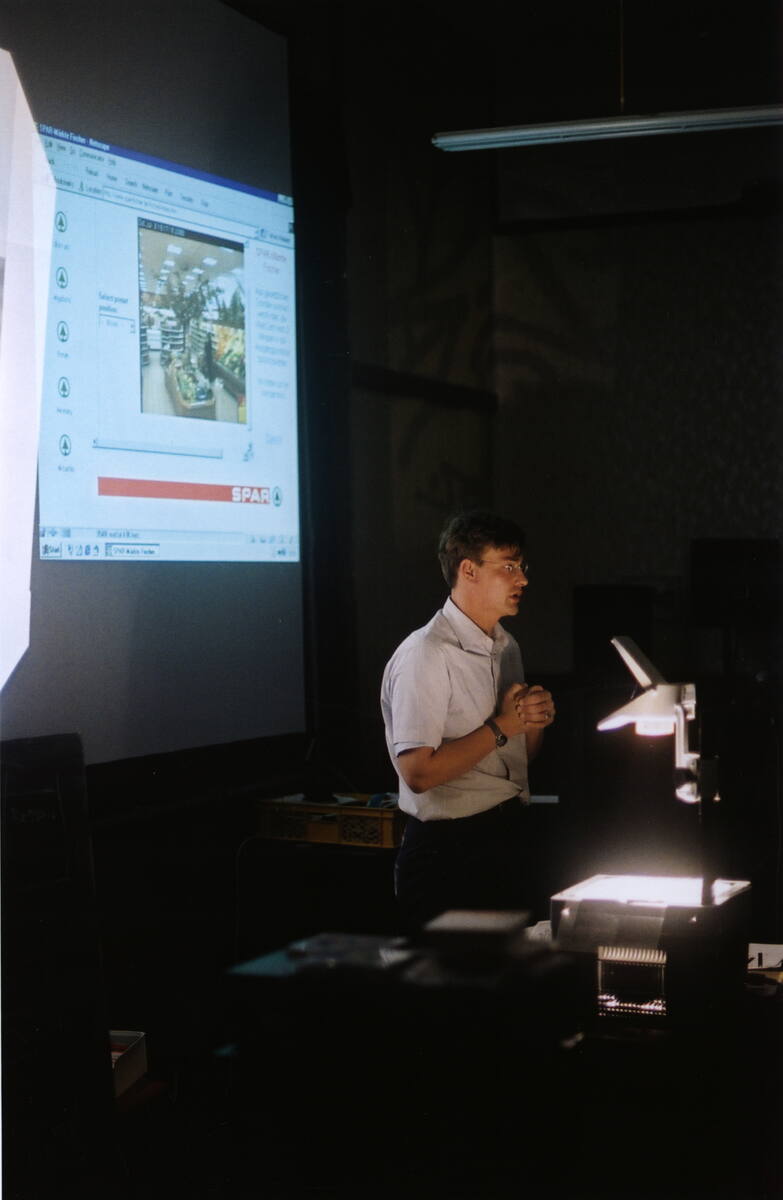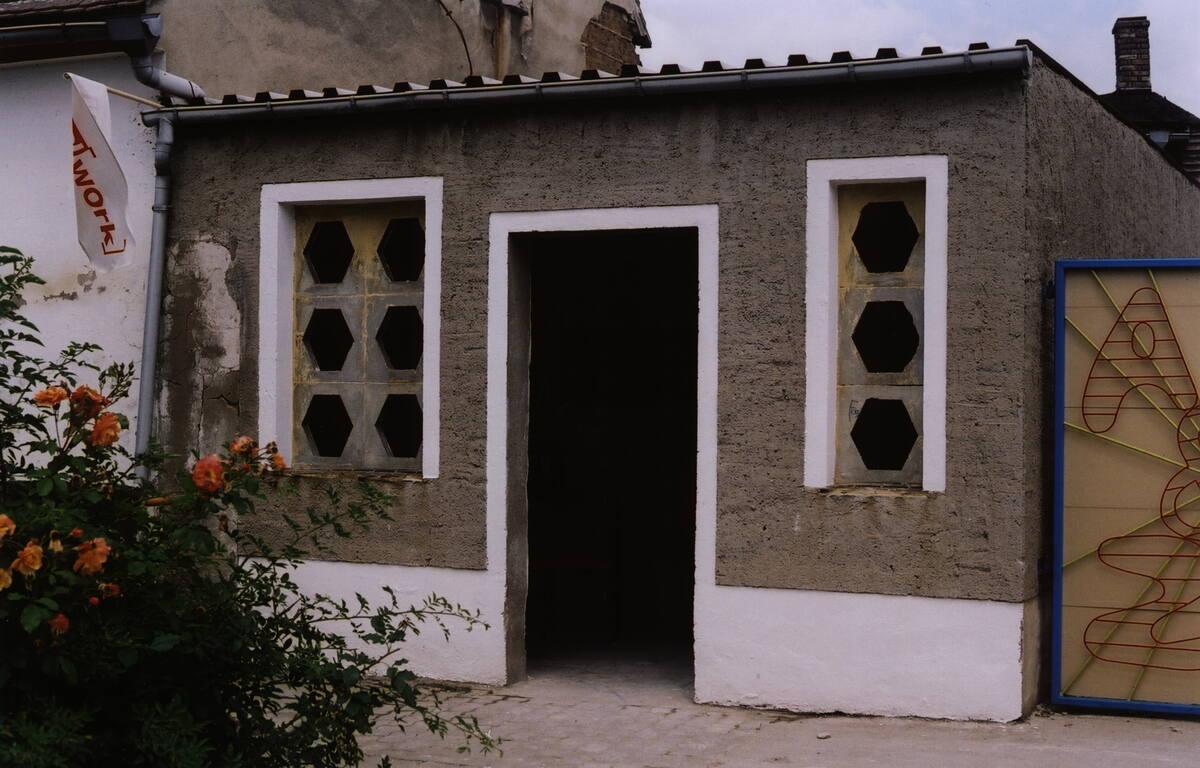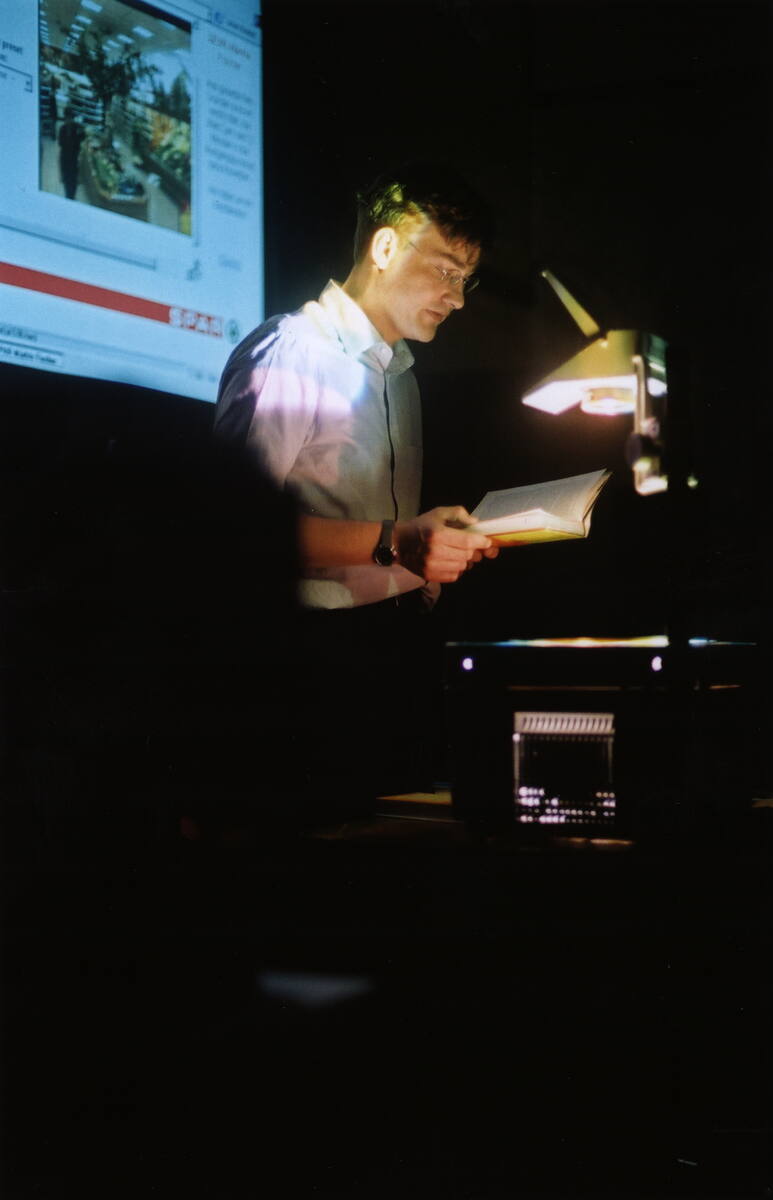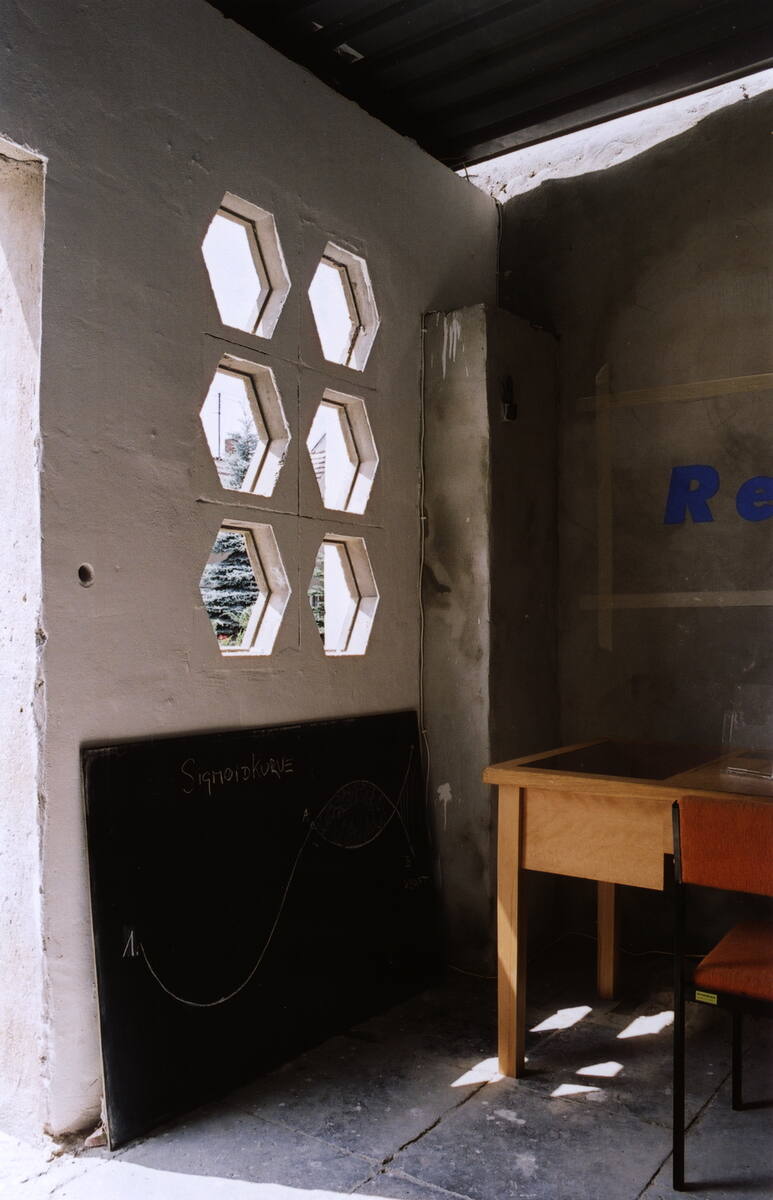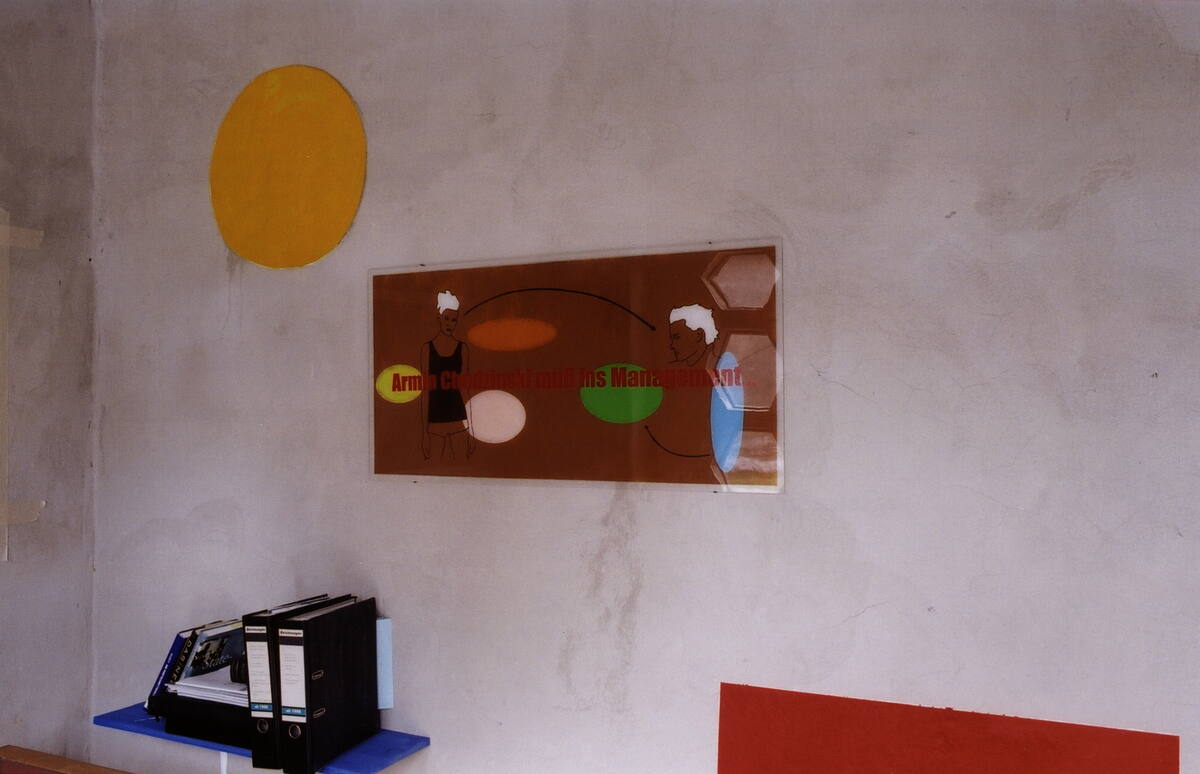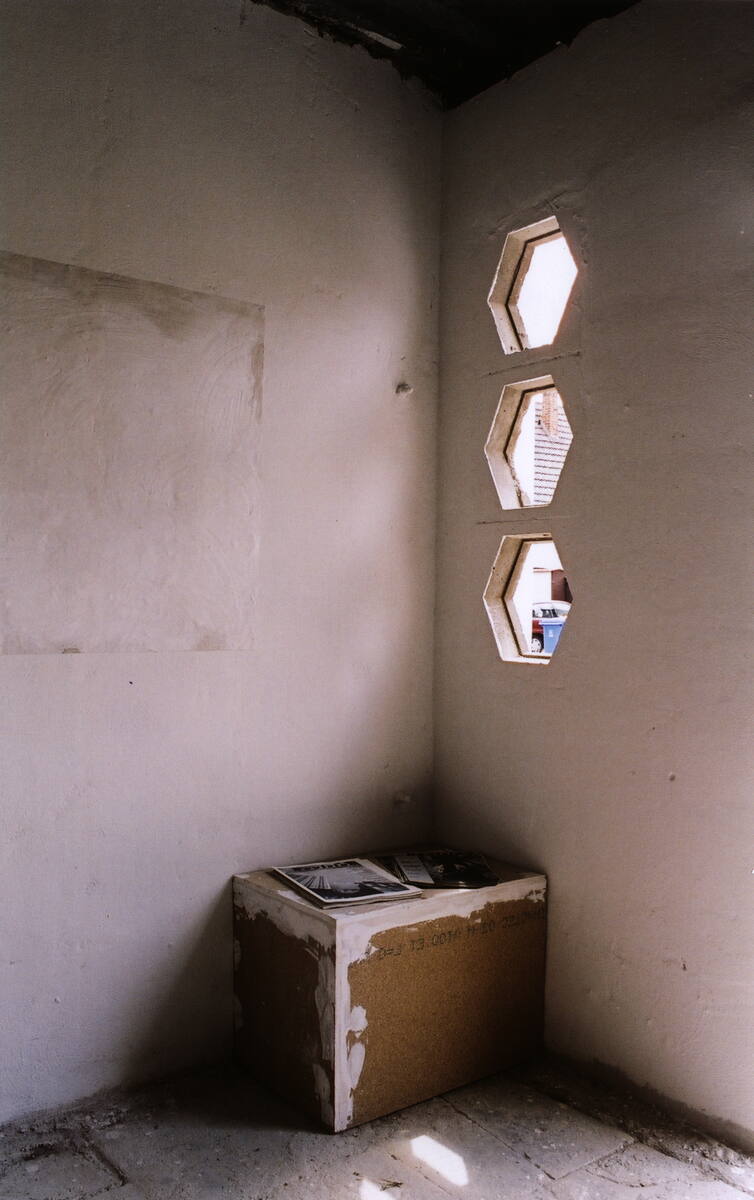Übergordnete Werke und Veranstaltungen
auditing unit
Personen
Media
Next to the entrance of the youth club Armin Chodzinski had set up his office inside a bus-stop. During self-imposed core business-hours and beyond, he was available to converse with visitors to his office. Chodzinski, who after an internship had risen into the management of a large trade company in 1999, had rearranged his collection of material in the bus-stop, documen- ting his experience as an artist dealing with the procedures and daily life within the company. Key-elements of his office set-up were his graphic programmatic for his future "Armin Chodzinski has to join the management" and his personal desk, which in continuous rearrangement serves as his mental support and archive. The desk is based on a no-longer-used desk from the board room of the trade company for which he works. By and by Chodzinski adapted this desk to his specific needs and insights. The materials used bear symbolic relevance; for example the plate of the desk is made of beech, whereas the borders feature more stately oak wood.
The topics discussed at the bus stop centered around the questions the Biennale focused on, the personal and societal meaning of work and unemployment, the role and function of an artist within the management of a company, where to draw the line between artistic and entrepreneurial practice and the requirements of managerial forms of organisation. Frequently personal biographies - Chodzinski’s as well as his guests’- served as the models for discussing the questions of what work actually is today and which models of activity could be relevant (or possible) in tomorrows society.
On Saturday, as a second contribution to the Biennale, Chodzinski lectured on "Myths, Managers and Melons - a report on societalpractice" at the inn "Zur Post". His presentation fragmentarily discussed his own biography, hierarchical structures within companies and the experiences garnered within the management and exemplarily compared the characteristics of artistic versus entrepreneurial activity. His lecture was accompanied by a veritable bouquet of presentation media, such as playing a song by Knarf Rell6m and audio recordings of an interview with management consultant Klaus Kobjoll, projecting slides, overhead transparencies, drawing on a blackboard and projecting images, which were recorded concurrently by a webcam in the vegetable section of a super market and last but not least, handing out drawings executed on tissues into the audience.
Text: Corinna Koch & Christiane Mennicke-Schwarz
Since I’m not as smart as all the ideologists and theorists...
"Since I’m not as smart as all the ideologists and theorists, I’ve simply got to say it and do it myself." This is the explanation Steve Stevaert gave the press in the summer of 1997, when he decided to abolish fares for public transportation in order to remedy the notorious lack of funds he experienced as the Mayor of a small Belgian town. I myself had repeatedly been under pressure to explain and to justify myself, again and again, so I was absolutely relieved after reading this article. While I was setting up my first office at the Art Academy - replete with control-clock, exact time schedules, in-and-out-boxes, etc - I was totally sure my protestant work-ethics, my socialisation and, last but not least, Max Weber would keep me from doing whatever people did at an art academy. Whatever that may be?
If you occupy yourself with art and economy and you do not apply a theoretic approach, - sure, I’ve had a "carreer" as a marxist-oriented ‘school’ communist,- but take an approach based on your own individual experience, then life is pretty tough. It’s not the questions, asked by others and to be answered by you, but the rather quizzical look your environment reserves for you. Things get pretty complicated, just because nobody is prepared to believe they’re just as simple as you would like them to be understood. What is there left to do for artists today,- or better: are there any artists left? How can you work at central points of this society, when it’s not even clear where these can be found? Exploit sub-culture? I found myself somewhere in the vicinity of people representing something of a youth-culture, but I never wanted to join the club - or maybe I couldn't? At some point I watched an interview with Pierre Bourdieu on television, who, by using criteria based on a model of economic and intellectual capital, accused Jean-Paul Sartre of having failed because of having positioned himself incorrectly within society. To me, this made sense, and encouraged me to search out the central point for discourse within the economic world.
The idea was not to join the establishment in order to have a carreer, but to take a look at what was going on in this world. To find out whether the Shell-Study, stating that the psychogrammes of managers are virtually identical with those of artists, is worth its salt. Actually, all I wanted was an internship, to spend some time skipping around in the world of economy, do some research, and to maybe even find some kind of enlightened position towards the reality dominating the lives of the majority of the population. So after a while I stumbled in the direction, into which every ambitious student of economy is drawn: after 12 months I found myself as the assistant to the management of a trading company, and not a small one, either. " You’re collaborating with a murderous system!" someone excitedly accused me after a speech in Berlin. "Duchamp sold Brancusis" shot through my mind, but I still had the decency to blush. Realising I was treading on thin ice, I quoted Steve Stevaert. (mentioned above)
Artists participate in exhibitions. ::" Relatives, friends and acquaintances can visit, be amazed by and be critical of these temporary ceasura in work. The confrontation, the work, is public and seems to be transparent up to a certain degree. Maybe that’s one of the utopian aspects of art. In the world of economy, in the upper echelons, only those with the right chip-cards, who have proven their identity, may access provisional results. The social environment is excluded. Within the economic world it is futile and rarely attempted to precisely formulate the present situation; it is carried away with the water of everyday business. The system mystifies itself. From a certain point on the system is fed by an image only, a sensually graspable target, something demanding exposure. "I’m a very sensorially oriented person, I need to be able to touch it at least once..." said not only my art professor, but also a manager during a conversation on virtual presentation techniques. The willingness to exhaust myself, to believe in images and to let them turn into material, is certainly a connective element with my ‘colleagues’ on both sides and my ‘boss’. By constantly thinking about these images one can probably avoid the question of what an image actually is, by continually asking only what it is that it wants to express. Image literacy - recently, there was a symposium in Berlin, on the topic of competence in reading images. Many people mainly teachers and educators debated on how to prepare students for reading images. At some point they began to discuss the question what all this was actually about and tossed and turned it around in loops: automatic drawing, installations, television, commercials and advertisement, oil painting, performance, all of these are words my computer's spelling correction programme is familiar with; only image literacy is underlined by funny red sqiggles whenever I write it During my internship for a large grocery chain I spent some time traveling with so-called meat-consultants, visiting super markets. Meat-consultants advise butchers in super markets on how to present their goods in the vitrines and on how to up-grade their steaks, so that they may be sold at a higher price, on how to store it and so on. Their central focus is the display of meat. How to present this display follows either a strategic or a personal concept and is aimed at coercing customers to buying. One gentleman I travelled with acted out of a very personal, if not to say inner, need. Standing next to the meat-display with him, | felt just like my relatives probably feel when they accompany me to a museum and I force them to stand right in front of whatever it is and try to make them understand what stroke of insight befalls or befell me looking at it.
The meat-consultant called my attention to the different grain directions of a rump steak, on the not-so-harmonious interplay between pork and turkey, of chops and filet. He commented on how old fashioned he thought this particular display was, full of bits and pieces and lacking trendy accents. A meat counter, pigheadedly ignoring the signs of the time, and meat-display-language-wise, stuck in the Fifties, post-war era. On our ride back in the car, we spoke about this diplay and particularly its connection to painting; " Naw, never mind, mate, I’ve turned my passion into my profession.... I1l put together a meat-counter in my sleep, but whenever you turn your back on them they just do whatever they want to do." ‘They’ were obviously the butchers, who rearranged their goods every day, the real owners of these counters, the galerists, so-to-speak.
To live in the realm of the business world is a research project, is an effort to gain insight from inside-out: today, the rich eliminate the jobs of the poor, because they get lost in
their lack of moderation in trying to realise the image and their failure in doing so, because they simply do not have the time to immerse themselves in really complex problems while
doing household chores, during dishwashing and vacuuming.
The basic cornerstones of work in the capitalist world are the notions of identity, self-exploitation and quality. Everybody is intent on quality in designing the procedures with which we accomplish even the simplest of chores. For example, when I do the dishes, I try to optimize the logistics involved. I take on the responsibility of doing the dishes and I try to do this as effectively as possible. I dirtied these plates, and nobody will come to clean up the mess and put them back into the cupboard. This is my job and in realising this, I perfect the procedure necessary for this undertaking: only rarely do I follow my heart's desire and begin by scrubbing the pans, just because I enjoy this so much. No, I begin by rinsing the glasses, because they are so fragile and sensitive to dirty dish-water. The personal gain in satisfaction no longer lies in the activity itself, but in the organisation of the procedure. In the end, I am no longer interested in the result, but in the most effective way of reaching this result. The problem is the notion of "Quality". Our society is based on "Quality", high-quality activity is at the same time desire and undoing. In the entrepreneurial context, this desire is a central topic: as soon as I find a possibility to identify myself with a problem, to make it my own, | will try to construct a high-quality process. The construction of such a process promises satisfaction, and any type of gain in satisfaction through an activity results in tendencies to exploit oneself. It‘s ahuman condition, which manifests itself most visibly in artistic work and which has meanwhile become the governing structure of work in capitalism. Every successful employee eliminates somebody else’s job, since he’s continuously intent on creating high-quality processes, which in the end require less and less workers. These processes are simpler, faster, and in the end the product is up-graded in spite, or maybe because of the fact that it takes less people to produce it. On a private level, this may very well function but on a societal level it creates a problem, since fewer and fewer people will have work. That is, work in the sense of a professional carreer or employment. The terminology becomes intangible. At first sight, identity, quality and self-exploitation are terms we do not immediately connect with the notion of work. The actual work is done where these terms are not applicable, that is to say where they are not detectable to society.
In the Blairian idea of Think Tanks, the creation of spaces of societal potential, artists are at once the best as well as the most helpless partners in the discourse. In the Post-Modern
era, nobody had actually counted on artists being anything more than court jesters and now they're even asked to give opinions. To me, the relevant question was, and still is, how to
react to this - and from today’s point of view, it is even irrelevant whether one enters professional life as an artist or as a butcher. The relevant factor is whether I do something
which I can connect to myself: whether I develop identity and whether I therefore have to take on responsibility. Of course a profession, whereof the majority defines itself as outside of
society and coquettishly toys with the position of the watcher-on-the-fence, has in the last instance a very special responsibility of deciding what to do and what can be done. Meanwhile, I’m convinced I should try my luck as a vocational consultant and follow the lead of thought from there.
Of course I would need to refuse to pass on any job offers, but would rather explain how identity cannot be found in economic contexts, but is only exploited as a means to an end. And I’m still not clear on what this end actually is and whether that is good or bad. Now we've really got a problem, much more difficult than categories of profit maximization or social acknowlegdement would lead one to believe. My naive vision is that one could accomplish a lot from this position - but most probably one would end up as the head of an employment office.
